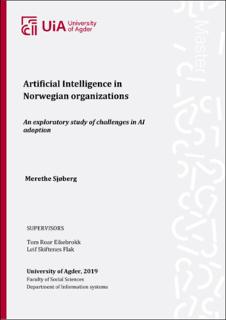| dc.contributor.author | Sjøberg, Merethe | |
| dc.date.accessioned | 2020-03-10T09:00:06Z | |
| dc.date.available | 2020-03-10T09:00:06Z | |
| dc.date.issued | 2019 | |
| dc.identifier.uri | https://hdl.handle.net/11250/2646133 | |
| dc.description | Master's thesis Information Systems IS501 - University of Agder 2019 | en_US |
| dc.description.abstract | In a fairly recent survey from Microsoft which evaluates the state of Artificial Intelligencein multiple European countries, it is found that Norway is lagging behind in the adoption and utilization of Artificial Intelligence. The report shows that Sweden has invested six times as much as Norway in artificial intelligence in the last 10 years, and Denmark even 13 times more. And while our neighboring countries –Denmark and Sweden –have already launched their national strategies for Artificial intelligence,the Norwegian government by the Ministry of Local Government and Modernization has yet to launchthe Norwegian strategyat December 19th, 2019which has been announced to be launched in 2019.At the time this study was started there was no Norwegian researchon this subjector any research onwhat the reasons can be for why Norway is lagging behindin utilizing Artificial intelligence. Usingan explorative and descriptive approach, this study aims to answer the following research question: “What challenges can impact Norwegian organizations’ adoption of Artificial Intelligence?”The studyaimsto be a starting point for trying to understand the phenomenonand the contribution of the study are multiple implications for further research as well as implications for practice. The research process consisted of creating a theoretical foundation based on literature from other countries which highlight challenges that may impact adoption of Artificial Intelligence.A survey was performed as an online questionnaire which was distributed to respondents through purposive-and snowball sampling, and ended up being completed by 123 respondents. The results show that the main challenges that can have an impact on adoption of Artificial intelligence in Norwegianorganizations are related to knowledge about AI, GDPR and its regulation of use of dataand security concerns. The study presents implications for further research such as “Has GDPR put an extra damper on the adoption of AI in Norwegian organizations?” and implications for practice by highlighting that the Norwegian Government has to put Artificial Intelligence on their agenda to a larger extent and that there must be a focus in sharing knowledge regarding AI if we want to increase the adoption of AI in Norwegian organizations. | en_US |
| dc.language.iso | eng | en_US |
| dc.publisher | Universitetet i Agder ; University of Agder | en_US |
| dc.rights | Attribution-NonCommercial-NoDerivatives 4.0 Internasjonal | * |
| dc.rights.uri | http://creativecommons.org/licenses/by-nc-nd/4.0/deed.no | * |
| dc.subject | IS501 | en_US |
| dc.title | Artificial Intelligence in Norwegian organizations : An exploratory study of challenges in AI adoption | en_US |
| dc.type | Master thesis | en_US |
| dc.subject.nsi | VDP::Teknologi: 500::Informasjons- og kommunikasjonsteknologi: 550 | en_US |
| dc.source.pagenumber | 98 p. | en_US |

